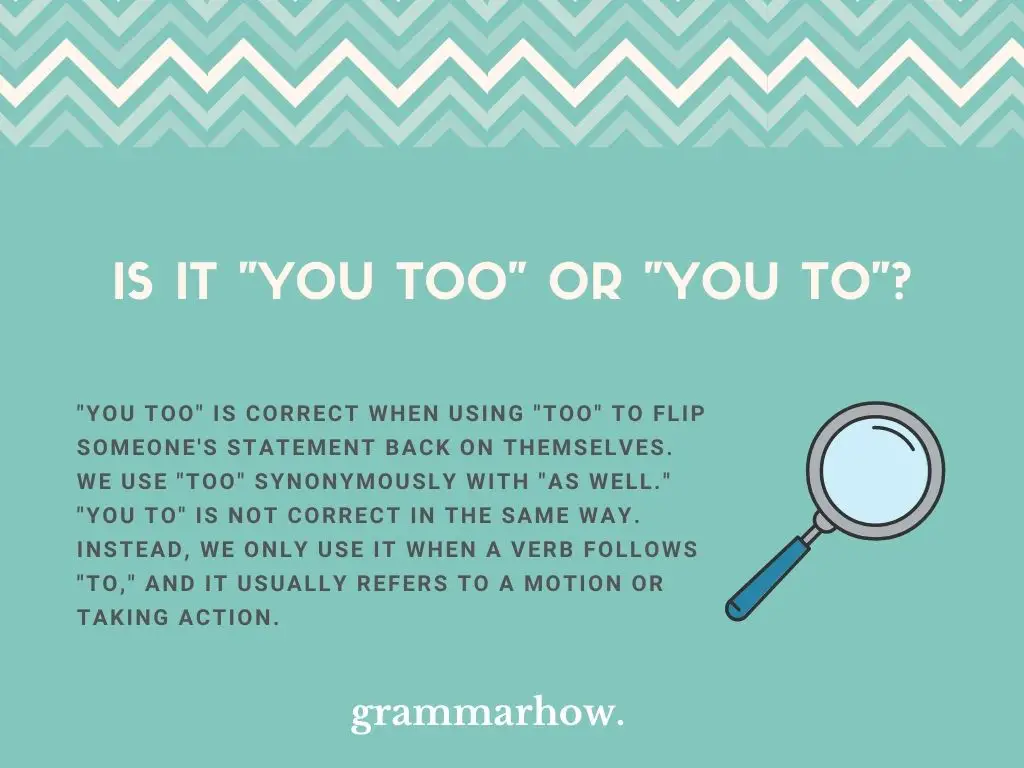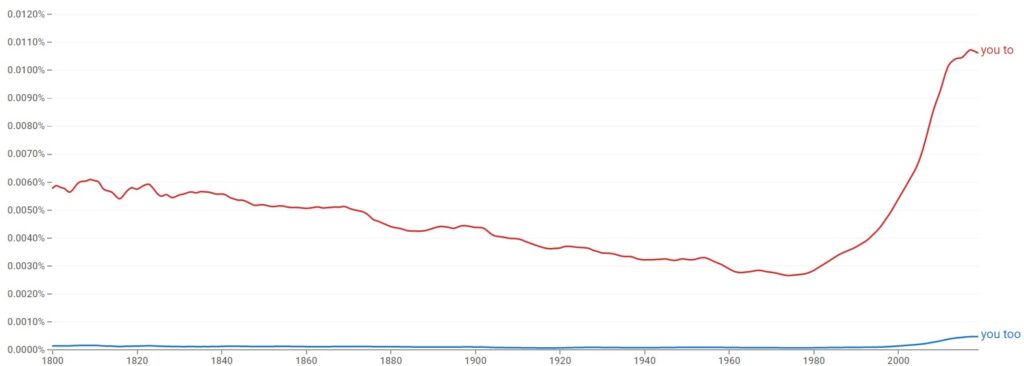When you’re stressing something with “too” or turning a sentiment around on someone, it’s important to know how to spell it. “To” only applies when talking about movement or motion. This article will show you whether “you too” or “you to” is correct.
Is It “You Too” Or “You To”?
“You too” is correct when using “too” to flip someone’s statement back on themselves. We use “too” synonymously with “as well.” “You to” is not correct in the same way. Instead, we only use it when a verb follows “to,” and it usually refers to a motion or taking action.

You might find that the following exchange takes place:
- I’ll see you later. Have a good day.
- You too!
“You too” works to throw the original “have a good day” back at the person that said it. It’s a polite way to say goodbye to someone. You can also show that you share the same sentiment as them.
On the flip side, “you to” is only correct when immediately followed by a verb. “To” acts as an introduction to the infinitive verb form in these cases:
- I need you to find out what happened.
When Should I Use “You Too”?
“You too” is a polite way to return a message or sentiment to someone. We use “too” to mean “as well.” This applies their original sentence back at them without us having to be direct or say the same thing they said.
“Too” can also come after a comma. We can split it into “you, too” if we want to follow standard formal English writing rules. This is common because the comma allows us to make sure there’s a clear distinction and emphasis with “too.”
- I miss you too. I hope you’ll be able to see me again soon because I don’t want to wait forever.
- You too, mate! I’ll miss you around here, but I know we’re going to see each other again.
- Of course! You too! Have a great life with your new job role! I hope it’s everything it’s made out to be.
- Thank you! You too! I know you’ll have a good time out there. I went last week and loved it.
- Oh, you too! Sorry, I was in a world of my own, so I didn’t hear it when you said goodbye to me!
When Should I Use “You To”?
“You to” is not used to return a message to someone. “To” is not synonymous with “as well” this time. Instead, it is the introduction to an infinitive verb (i.e. “to have” or “to need”). We use “to” as a way to introduce an action.
If there is no verb after “you to,” then it is incorrect. You have to always include one in a sentence if you want to make sure you use it right.
- I need you to go and see whether you can get booked on to the listing in time.
- I want you to find out who did it. I don’t care what you have to do, but it’s really important to me.
- I thought it made sense for you to go to the park. Clearly, I was wrong about your intentions.
- I need you to know something important, but I can’t talk about it here. Can we go somewhere private?
- I want you to believe in yourself. I’m so tired of hearing you constantly doubt what you can do.
Are “You Too” And “You To” Interchangeable?
“You too” is not interchangeable with “you to.” You might have already worked this out from the previous sections since “too” means “as well,” but “to” is the first word of the infinitive verb form.
“To” is a common misspelling for “too.”
When said aloud, both of the words sound the same. “Too” sometimes allows us to stress the “oo” sound (making it longer), but this isn’t always the case.
Many people get confused because they’ll sound out sentences containing either “too” or “to” and think they sound the same, thus meaning they should be spelled the same as well.
Is “You Too” Or You To” Used The Most?
It might also help to look into some statistics to find out which one is more common. You might be a little surprised by the findings.
According to Google Ngram Viewer, “you to” is used the most. We know this because it applies to many more contexts and situations than “you too.”

“You to” sets up the infinitive verb in a sentence. It’s very common to see “you” and “to” come before verbs, so it makes sense that “you to” would be vastly more popular than “you too.”
While “you too” is still used (but not as common, according to the graph), it’s more specific in usage. We only use “you too” when returning a sentence or statement to someone else with the same meaning. This situation doesn’t come up as much as needing to use a verb.
Is It “I Love You To” Or “I Love You Too”?
“I love you too” is the only correct form here. We use “too” to turn the original statement (“I love you”) around on the person that said it. There can be a comma between “you” and “too” in this case. “To” is never correct because we do not include a verb after it.
- Correct: I love you too. I hope I’ll get the chance to see you again later.
- Incorrect: I love you to. I need to know that you’re home safe.
You may also like:
“I Love You Too” or “I Love You, Too”: Comma Rules Explained
“And To You” vs. “You Too” – Difference Explained (With Examples)
Quiz: Have You Mastered “You Too” vs. “You To”?
You should be a “too” and “to” master by now. Let’s put that to the test.
- I miss (A. you too / B. you to). Please don’t be gone for too long.
- I’ll need (A. you too / B. you to) sort this out on your own time. I’m not paying you for this.
- I want (A. you too / B. you to) behave yourself. Please stop acting like you’re better than that.
- (A. You too / B. You to), man! I’m so glad you’re having a good time! I’ll see you later!
- I’ll be with (A. you too / B. you to). Just let me know when I need to be there!
Quiz Answers
- A
- B
- B
- A
- A
You may also like:
To Many or Too Many? Grammar Explained (Helpful Examples)
To Far or Too Far? Grammar Explained (Helpful Examples)
To Much or Too Much? Grammar Explained (Helpful Examples)
